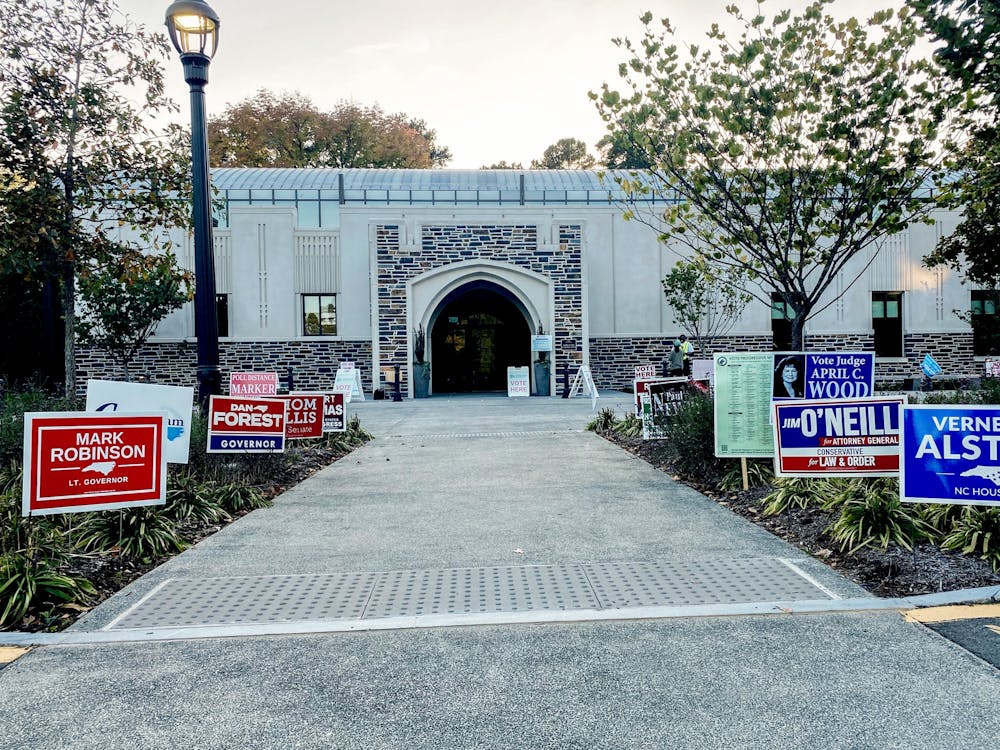For more election coverage from across North Carolina, visit One Vote N.C., a collaborative between The Chronicle and six other student newspapers that aims to help college students across the state navigate the November election.
Duke is keeping students busy on Election Day, but some professors are making changes on their own.
With Election Day approaching, President Vincent Price and Chancellor for Health Affairs A. Eugene Washington issued an Oct. 7 statement declaring Nov. 3 a “no-meeting day,” outside of necessary operational activities. They did not cancel classes, though they noted that “faculty always have the flexibility to make alternate arrangements”.
With most of Duke’s nearly 16,000 undergraduate, graduate and professional students being eligible to vote in November’s consequential election, some faculty members have made adjustments to their class plans to accommodate students who wish to cast their ballots on Election Day.
Dirk Philipsen, associate research professor in the Sanford School of Public Policy and senior fellow at the Kenan Institute for Ethics, said he is making class non-mandatory on Nov. 3.
“I’m going to make myself available to students to talk about the election [on Tuesday],” he added.
Juliette Duara, also a senior fellow at the Kenan Institute for Ethics, said she’s giving students the day off “to vote and to take a deep breath, to get ready to finish the term,” noting the lack of breaks or holidays built into this semester’s schedule.
Philipsen said that “in a real democracy, one should have the day off to fulfill one’s duty as a citizen and vote,” and noted that many other countries have made Election Day a national holiday.
The United States trails most other developed democracies in voter turnout, according to a Pew Research Center study, with 2016 turnout being about 56% of the eligible voting population.
In 2016, 14% of those who didn’t vote in the elections cited “being too busy or having a conflicting schedule” as the primary reason for not voting, according to the Pew Research Center’s analysis of Census Bureau Data.
Philipsen expressed the possibility that content won’t be covered as extensively this semester as it usually would have been, and that canceling class on Election Day might exacerbate that problem—but added that he’s “making himself much more available to [his] students outside of the classroom than [he] usually does” to cover the curriculum completely.
Duara, on the other hand, eliminated one day’s worth of content from the syllabus, emphasizing that “there’s enough going on, and it’s been kind of relentless this term.”
Philipsen and Duara both expressed their optimism that early and absentee voting—with an early voting place on campus at the Karsh Alumni and Visitors Center—gives students plenty of options to vote outside of Election Day.
So far, this election year has been like no other, with record numbers of votes being cast through mail-in and in early voting. As of Monday, a total of 3.1 million voters had already cast their ballots in North Carolina, accounting for nearly 40% of North Carolina’s registered voters.
In Durham County alone, 91,977 people had voted early as of Monday, with 9,836 of those votes cast at Duke’s Karsh Alumni Center. In 2016, Durham County had a total of 119,646 early votes cast.
Other universities in the area have also continued to plan for classes on Election Day. The University of North Carolina at Chapel Hill leaders have stated that the compressed nature of their calendar rules out the possibility of making Nov. 3 a day off, though roughly a dozen student leaders sent the administration a letter asking them to reconsider. North Carolina State University has also yet to make any indication that the university will cancel classes on Election Day.
“What professors, at minimum, should be able to do is to make sure students have the knowledge, ability, tools and time to vote through absentee or early voting,” Philipsen said.
Duara emphasized how consequential this year’s election is, and said that “if you want to have the right to complain afterwards, you have to exercise your right to vote.”
Get The Chronicle straight to your inbox
Sign up for our weekly newsletter. Cancel at any time.
Anisha Reddy is a Trinity junior and a senior editor of The Chronicle's 118th volume.

